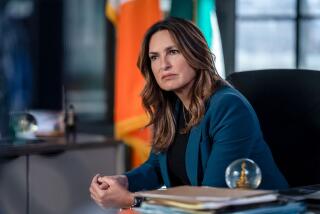Jury Convicts Haggerty of One Cocaine Sale to Police
- Share via
In a split verdict, a Los Angeles Superior Court jury Friday found actor Dan Haggerty guilty of one count of furnishing cocaine to two undercover police officers but decided that the officers on another occasion entrapped television’s Grizzly Adams into selling them the drug.
“I’m kind of heartsick,” the brawny, bearded actor told reporters outside the courtroom. “It’s kind of hard to understand why they did what they did.”
“I’m just at a total loss to explain this verdict,” Haggerty’s attorney, W. Michael Mayock, told Judge Aurelio Munoz. “There is nothing distinctive between those two counts. If there was entrapment, I would submit that there was entrapment as to both days.”
Despite those remarks, Munoz denied Mayock’s request to set aside the guilty verdict.
Deputy Dist. Atty. David P. Conn, who prosecuted the 41-year-old actor, said he found nothing inconsistent in the jury’s decision. The police officers had several contacts with Haggerty between the first and second drug sales, Conn said, and the jury was instructed to base its decision on the officers’ conduct in each separate incident.
Munoz allowed Haggerty to remain free on bail until April 4, when he is scheduled to be sentenced. Haggerty could face up to five years in state prison. Mayock said he will request probation for his client. Conn said his office has not yet decided what it will recommend at sentencing but added that he would not strongly oppose probation.
Haggerty is most famous for the role of the rugged mountain man he created in the 1977-78 television series, “The Life and Times of Grizzly Adams,” in which he co-starred with a bear.
The only issue before the jurors during Haggerty’s five-day trial was whether undercover Los Angeles Police Officers Raymond Martin and Barbara Eggar, assigned to the department’s entertainment industry task force, improperly induced Haggerty to sell them cocaine.
On the witness stand, Haggerty conceded that he did so twice--on March 7 and June 6, 1984. However, his lawyer, Mayock, argued that Martin and Eggar went beyond the bounds of acceptable police conduct in persuading Haggerty to furnish the drugs.
A key section of one of the instructions read to the jury states that entrapment occurs “if the actions of the law enforcement agent would generate in a normally law-abiding person a motive for the crime, other than ordinary criminal intent.”
An example of such conduct, the instruction says, “would be an appeal by police that would induce such a person to commit the act because of friendship or sympathy, instead of a desire for personal gain or other typical criminal purpose.”
It was the friendship issue that resulted in the split decision, jury foreman Claudio Tiznado, 55, told reporters outside the courtroom.
“Entrapment is a very difficult law to decide,” Tiznado said. “We felt in Count 1, they (the officers and Haggerty) hadn’t established a real friendship, where in Count 2, we felt the police went a little bit overboard.”
According to testimony at the trial, Martin first met Haggerty through a mutual acquaintance in December, 1983. The following January, Martin and Eggar, posing as a wealthy investor and his girlfriend, visited Haggerty’s home to discuss a business deal.
Eventually, Haggerty testified, he and his wife came to regard Martin and Eggar, in their assumed identities, as close friends. Haggerty testified that Martin bragged about having been involved in major cocaine deals and that Martin, in a telephone conversation before the March 7 sale, asked Haggerty to provide him with cocaine “to party.”
Martin testified that it was Haggerty who spontaneously suggested the sale of cocaine in March. On that occasion, Haggerty took $325 from the officer for less than three grams of the drug.
Later, Haggerty testified, Martin told him that he wanted a larger amount to satisfy Eggar’s need for cocaine during sex. On June 6, Haggerty provided about 11 grams of cocaine, for which Martin had paid $1,100.
More to Read
Sign up for Essential California
The most important California stories and recommendations in your inbox every morning.
You may occasionally receive promotional content from the Los Angeles Times.









